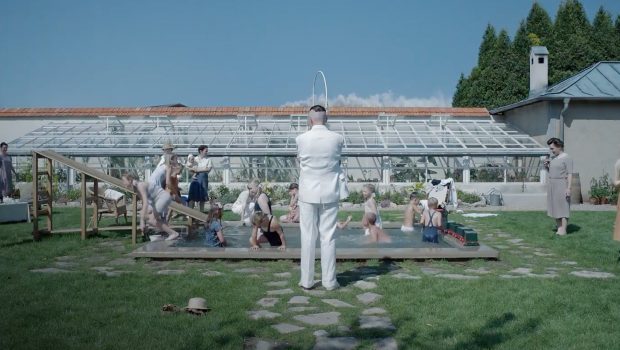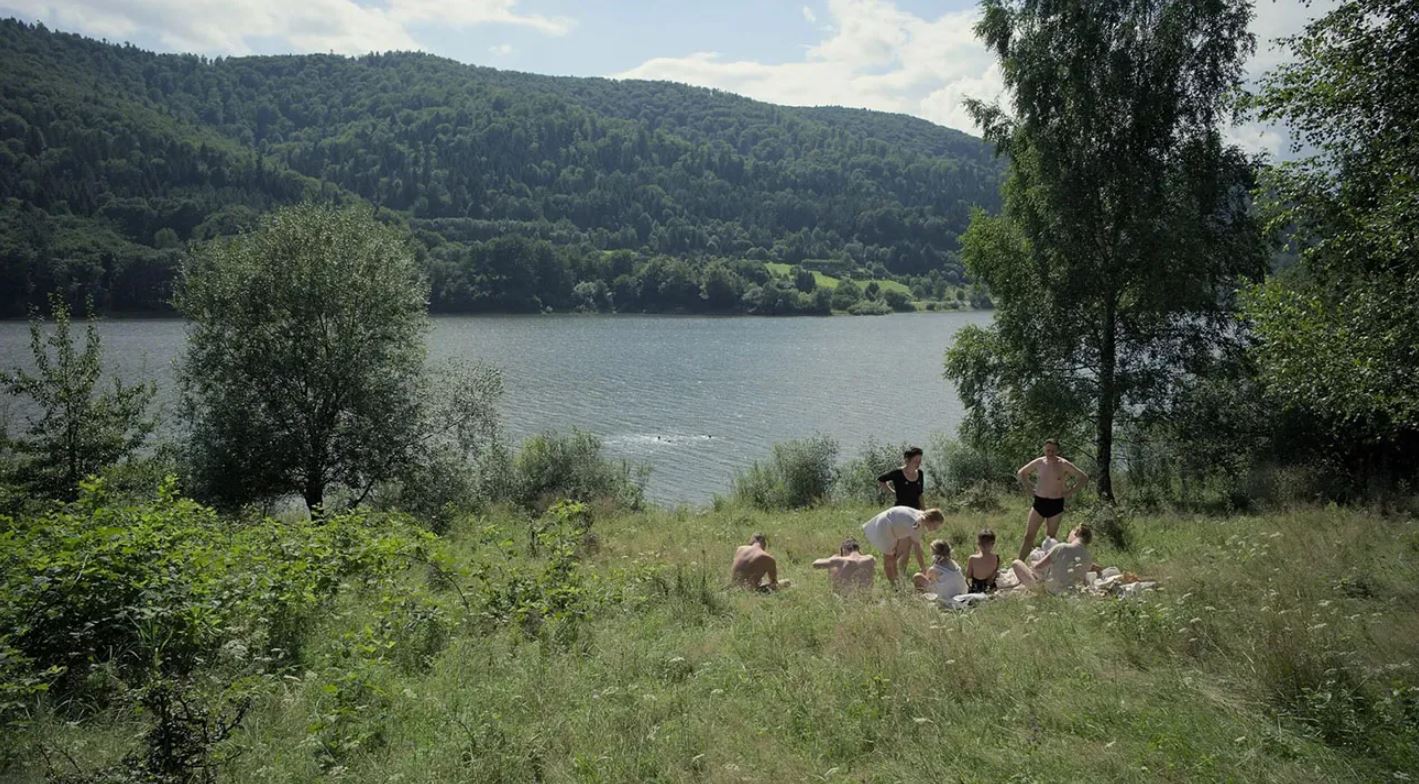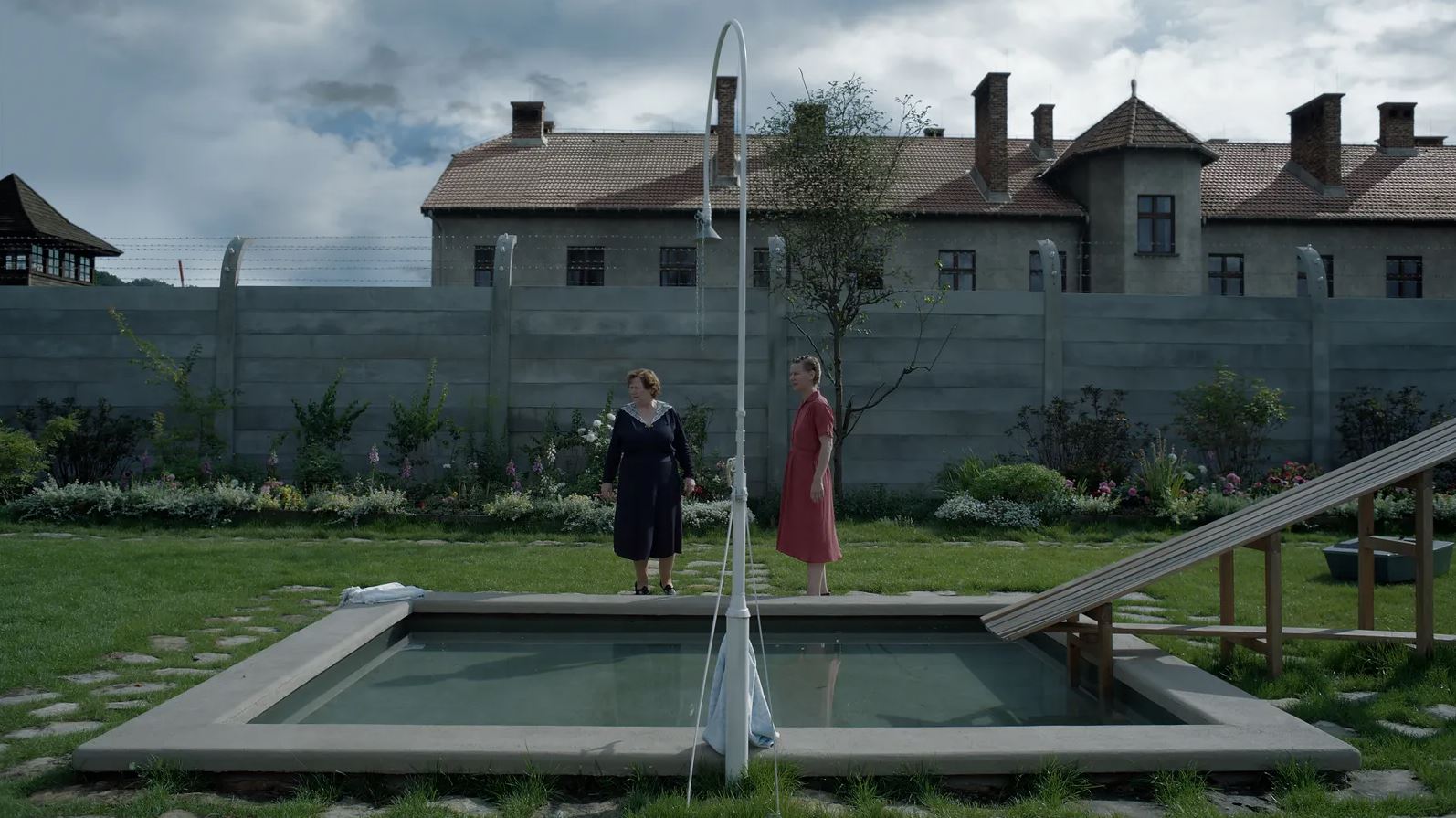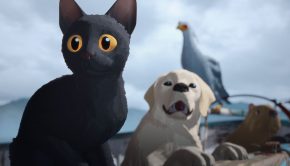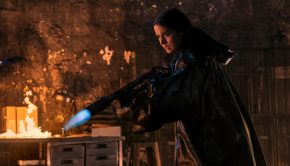The Zone of Interest – Film Review
Reviewed by Damien Straker on the 24th of February 2024
Madman presents a film by Jonathan Glazer
Written by Jonathan Glazer based on The Zone of Interest by Martin Amis
Produced by James Wilson and Ewa Puszczyńska
Starring Christian Friedel and Sandra Hüller
Cinematography Łukasz Żal
Edited by Paul Watts
Music by Mica Levi
Rating: M
Running Time: 105 minutes
Release Date: the 22nd of February 2024
The Zone of Interest is about how the atrocities of the Holocaust were partly made for social gains. More specifically, it focuses on what a man will do to live a comfortable, preserved life against the most heinous backdrop imaginable. The film’s subtle, understated, and challenging form elicits from English filmmaker Jonathan Glazer. It marks his fourth film and a ten-year gap since his previous feature. He last made the unforgettable psychedelic sci-fi film Under the Skin (2013). Scarlett Johansson was tasked with playing an alien who drove around Glasgow collecting men before dispersing of them in weird, violent ways. Zone continues this brand of highly unique, challenging cinema. While often ambiguous and removed from its characters and plot, the way its audio-vision enriches its story concept is unique and deeply unsettling.
Glazer concedes he was more interested in observations and what he calls ‘forensics’ than story. However, there is still a dramatic premise at the centre of Zone. He adapts a 2014 novel by Martin Amis, which offered a fictional account of a real-life Nazi commandant. The man was living with his family on a property located adjacent to the Auschwitz concentration camp. In the film, the commandant is Rudolf Hoss (Christian Friedel). He lives with his wife Hedwig (Anatomy of a Fall’s Sandra Huller) and their children on a property next to the camp. The film studies their behaviour around the zone as they appear indifferent to living next door to such violent atrocities. One of the biggest points of personal conflict involves Hoss preparing to be transferred away from the zone to aid the Nazi war effort elsewhere. Hedwig is livid. She wants to sustain the comfortable lifestyle they have built. Most of the film involves watching the family activity, including having meetings, playing by the river, or in a scene of dread locking up the house at night. Their actions are then left to the audience’s interpretation.
After Under the Skin and now Zone, Glazer is undoubtedly an accomplished film stylist. His formal choices are precise. They are deliberately chosen to express the characters’ emotional distance from their social conscience. The film opens with an extended shot of darkness. It compares to the Dawn of Man sequence in 2001: A Space Odyssey (1968). Director Stanley Kubrick left the audience in the dark before opening his film. One theory is that the blackness that opens Zone infers how the Hoss family is emerging from anonymity. Glazer then films the Hoss family from a long angle camera shot during a peaceful outing by the riverbank. The camera remains still. The frame purposely keeps us at a distance from the family dynamics. The sounds from the camp are audible but faint enough that it does not disrupt the characters’ moods. These technical choices reflect the family’s indifference to the war crimes committed next door. Glazer intends to observe the family dynamics rather than stress the most obvious point, which is condemning their self-indulgence and blindness to human atrocities.
Glazer’s technical choices continue influencing the theme of emotional distance. One example is his decision to use completely natural lighting instead of artificial shadowing. His choice removes the cinematic artifice where techniques can influence our opinion of the family. Glazer continues creating objective cinema by observing actions from afar. His camera regularly frames scenes from retracted long angles so there is a gap between the family and the audience. This choice allows people to view the characters as an ordinary family. The audience can then project themselves onto them and ask: what would you ignore to preserve your social status? Distance was prevalent during filming too. The actors inhabited the set on their own. Glazer chose to install cameras around the zone. The actors could be left to explore scenes while the film crew recorded them remotely. The filming method again underlines distance because the characters are psychologically removed from their conscience.
Many images throughout Zone remain open to the audience’s own interpretation. For example, the exterior of the camp is juxtaposed with lush close-up shots of flowers. The thematic inference is that Glazer is comparing the evils of industry and commerce with nature itself. Criticism of commerce is permeated throughout several business meeting scenes. Hoss and company discuss installing new machinery that will increase the efficiencies of the camp’s gas chambers. Meanwhile, Hedwig proudly shows off her garden. The yard includes just a single wall separating the family from the camp. Glazer’s camera crabs sideways so we see the compound in the background. The movement though renders the building into a fleeting memory. When discussing the property, another woman says to Hedwig, ‘you’ve really landed on your feet’. In a different scene, Hedwig fawns over a fur coat she dons in her room. These scenes of business and vanity suggest the family are social climbers. Their indifference to the terrible atrocities has afforded them a comfortable lifestyle during wartime and a means of survival. However, the understated film style means these are merely interpretations of what these images might be expressing.
The arc of the story and the protagonist is found once cracks appear in the façade of distance. The film’s closing scenes capture this theme brilliantly. While looking down a corridor, Hoss sees a pair of janitors tasked with cleaning the glass panels at a Holocaust Museum. Some have suggested it is a flash forward in time. Behind the glass are hundreds of shoes belonging to the Jews murdered during the war. The image is the film’s most chilling, affecting moment. It marks an existential crisis. The imagery also asks Hoss if he is comfortable with a hollow, meaningless legacy. Similarly, he quips that he considered gassing the entire Nazi hierarchy at a lavish party. The sparse dialogue is pivotal. It suggests contempt for everything around him, including the people he serves. Is his role then completely removed from personal beliefs and merely a survival ploy? The film mirrors its opening by closing with darkness. There is no clear entry as to how Hoss’s family reached their heinous mindset and no closure. It is Glazer commenting on the emptiness of this man’s heart, ideologies, and ultimately his legacy.
Zone is a film to see more than once because to a fault it is a highly remote experience. After Under the Skin, Glazer is visibly disinterested in conventions and predictable beats and rhythms. It is an admirable quality to have as a filmmaker. However, Zone’s glacial pacing and retracted form present their own challenges. This is not a film that stages dialogue-heavy scenes of interpersonal drama either. There are very few close-up shots of the characters’ faces. It is about observing behaviour from afar and even personal subtraction. Most of the characters have almost no reaction at all to the terrible events around them. Instead, we are asked to supply own interpretation of their actions. While it is a difficult film, the final scenes are terribly affecting and underline the emptiness of social conscience, social climbing, and legacy. Consequently, The Zone of Interest is a highly challenging depiction of warfare that warrants several viewings.
Summary: While ambiguous and removed from characters and plot, the audio-vision enriches Zone's story in unique and unsettling ways.


